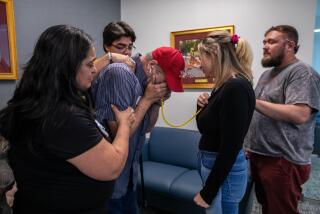Donors Rebound Quickly After Giving Up a Kidney
- Share via
Get a new kidney and you will be poked, prodded, inspected and detected for the rest of your life.
But give a kidney and chances are you will walk out of the hospital and--except for a few postoperative checkups--no one will follow your progress for long. That’s because kidney donors generally do very well after the operation.
Take David Bocchichio of Unionville, Conn. Eight weeks after he donated one of his two kidneys, he was racing a mountain bike in downhill slalom competitions.
Or Jan Voland of Plainfield, Conn. She was on a stationary bicycle three weeks after she donated a kidney and within months was running and walking four miles a day.
A recent study backs up their positive experiences.
Angela Bogetti-Dumlao, the transplant coordinator for California Pacific Medical Center in San Francisco, followed up with 62 living donors and found that 12 months after donating a kidney, 82% of donors perceived their health to be about the same as it had been before.
An additional 9% of the donors felt that their health was somewhat better than before donation, and 2% felt it was much better than before; while 7% said their health had declined.
“Living donors were asking me the big question: ‘How is my health going to be affected afterward?’” said Bogetti-Dumlao. She conducted the study, which was published in the June issue of Progress in Transplantation, out of “a desire to give them the right information.”
Cathy Drouin, a kidney transplant coordinator for Hartford Transplant Program, said she believes it would be useful to track donors so that potential donors have all the information they need.
“Certain personalities want to know if they have a 5% chance of this or a 10% chance of that,” Drouin said.
However, Drouin said she thought it might be difficult to have a long-term tracking project for donors because they are usually so well, they may not want to be bothered with filling out questionnaires or going for bloodwork as part of a follow-up study.
Bogetti-Dumlao said she would like to see a registry that follows donors for a lifetime, in the same way that recipients are tracked.
All the kidney donors included in her study scored better than the general population on a standardized health questionnaire.
“These results support the theory that living-kidney donation does not impact the donor’s health negatively,” Bogetti-Dumlao said.
Interestingly, unrelated donors scored higher than the related donors in the vitality category. “Although this comparison is not statistically significant, the finding is supported by the theory that living, unrelated donation is motivated by altruism,” she wrote in her report.
The lowest scores in the vitality category went to distant relatives who had donated kidneys. Bogetti-Dumlao wrote that if the donation was “done due to pressure from the family or feelings of obligation, donors could perceive their health as lower than the norm after donation.”
Bogetti-Dumlao also noted that many donors said they would have appreciated more follow-up: perhaps checkups with a nephrologist or more emotional support from the transplant team.
Of course, some donors probably wouldn’t have sought any extra medical attention. Bocchichio, a physical education teacher at the Hockanum School in East Hartford, was the subject of much publicity last year--including an appearance on “The Oprah Winfrey Show”--when he donated a kidney to Evelyn Arroyo, the mother of three of his former students.
Bocchichio, now 26, donated the kidney early in the year and returned to his job teaching within six weeks of the surgery. After the first week or two when he was in a lot of pain, Bocchichio said, he felt better and better and now feels completely healed from the transplant.
Of far greater concern to him are injuries he sustained over the summer when he crashed while mountain biking: broken ribs and a separated shoulder. Asked whether doctors approved of mountain biking so soon after the organ donation, Bocchichio said: “I don’t listen to doctors very much.”
Voland, 47, who donated a kidney to her younger brother, Mike Parisella, in October 2000, said, “I’m back to normal. I can do anything I choose to do.”
Voland said she does still have a slight pulling feeling in the area where the incision was made through seven layers of muscle. She expects, though, that within the next six months that sense of pulling will vanish.
A coach at Plainfield High School, Voland went back to coaching basketball in January of this year and then onto coaching softball in the spring. The softball particularly helped her recovery.
“When I was swinging that bat, I started to feel better,” Voland said.
She said she was a little surprised at how little follow-up was involved for a donor. After the checkup one month after the operation, it was like, “Thank you, see ya.” It was very different than before the surgery, when so many questions were asked, she said.
Brad Barrows, 41, of East Hartford, gave a kidney to a recipient he did not know beforehand.
Barrows, who works as a receptionist at the state Department of Children and Families, called Drouin almost four years ago and said he wanted to provide a kidney to someone who needed one.
Drouin eventually matched Barrows with Jose Spivey, then 12. The transplant was in July 1998.
Barrows, who is blind, said that just three months after surgery he went on a rigorous, eight-mile hike. “It was a little uncomfortable but doable.” Now, three years later, Barrows said, “I have no pain, no discomfort. Unless I purposely feel where the incisions were, I can’t even feel where I had surgery.”
Barrows said the surgery “should not be taken lightly,” but it is “worth every bit of the discomfort to see your recipient thriving.”
*
Kathleen Megan writes for the Hartford Courant, a Tribune company.






